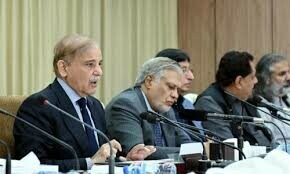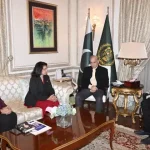ISLAMABAD: The government is prepared to engage about six technical specialists and consulting firms from the market at special compensation packages, starting with the ministries of energy and finance, while concurrently working on ideas for expenditure management.
The recruitment model for ‘technical advisers’ would subsequently be replicated in 10 other economic and technical ministries in due course, a senior official told Dawn. He said Finance Minister Mohammad Aurangzeb would build an expert team of his own, probably from the banking sector, to look at things from a fresh and doable angle, rather than the traditional bureaucratic set-up.
Similarly, the petroleum division would promptly engage ten “technical advisers,” including two consultants, at Special Professional Pay Scales (SPPS). The updated pay structure for the four grades of SPPS has already been authorized by the prime minister. It includes an all-inclusive package of up to Rs1.5 million for SPPS-II, up to Rs1 million for SPPS-III, and up to Rs500,000 per month for SPPS-IV.
According to knowledgeable sources, Dr. Ishrat Hussain initially suggested to the PTI government that technical advisers for the economic and other technical ministries be appointed as independent, higher-ranking positions than federal secretary, in line with the US practice of having undersecretaries. There was a widespread belief in some quarters that one of the main obstacles to the government’s ability to effectively execute deliverables for foreign investment was the senior bureaucracy that currently existed.
Approximately twelve “advisers” would be assigned to different ministries amid proposals for austerity measures.
According to Dr. Ishrat, these technical advisers ought to be at a higher position than secretaries and beneath federal ministers. Nonetheless, this plan was unable to proceed to the execution stage because to the hesitancy of influential secretaries, especially former DMGs. The federal secretary would continue to be the technical advisers’ point of contact this time around.
A technical adviser for LNG business, three advisers (technical, financial, and legal) for exploration and development, three advisers (legal, contract management, and petroleum economy) for the mineral sector, and a technical adviser to the petroleum minister are all being hired under the first batch. Via a headhunting company, they would all be employed in SPPS-1 for a three-year term that might be extended for an additional two years. Furthermore, two consultants would be assigned to the joint ventures and investment and refining wings of SPPS-II.
According to an official, the procedure, which includes formal financial allocations, would be finished in 45 to 50 days so that the two teams in the ministries of petroleum and finance can begin operations on July 1st of the following fiscal year. KPIs would still apply to their jobs.
The ministries of information technology and telecommunications, power, water resources, commerce, national food security, industries and production, health services, aviation, and maritime affairs are a few others that should consider doing the same.
Officials stated that the Special Investment Facilitation Council (SIFC) was pushing for expedited result-oriented engagements with Saudi Arabia, China, Qatar, the UAE, and Turkiye, among other countries, and that the divisions of finance and petroleum had been given priority for new hires primarily because of their crucial role in handling the majority of the major upcoming foreign investment plans.
The principal players held the view that the addition of a new layer of specialists was necessary to tackle the issue of insufficient professionals and insufficient ability and knowledge to efficiently assist provinces, investors, and other stakeholders. Due to the lack of detailed exploration, bankable feasibility studies, mechanization, and value addition in the mineral, oil, and gas sectors, this was producing subpar results.
In addition to development, production, value addition, use, marketing, and exports, the technical consultants for the mineral sector are expected to offer experience in sustainable resource exploration, planning, due diligence, assessment of investment proposals, and transaction structures.
Moreover, different financial structures in the provinces and other organizations were making it difficult to draw in investment. As a result, the advisors would carry out financial analyses of prospective initiatives, market patterns, and financial regulatory frameworks. They would also assist in conducting financial, investment, and risk analyses, developing investment plans, and putting together strong legal and regulatory frameworks.
Even though LNG now makes up nearly half of SNGPL’s sales volume and nearly 30% of the country’s gas mix, serious flaws in policy making and implementation strategies have been noted. Additionally, legal challenges are starting to surface in both local and international courts.
According to the sources, the government occasionally asks eminent business associations like the Pakistan Business Council and Pakistan Banking Association for pro gratis assistance in exchange for specialized knowledge.








